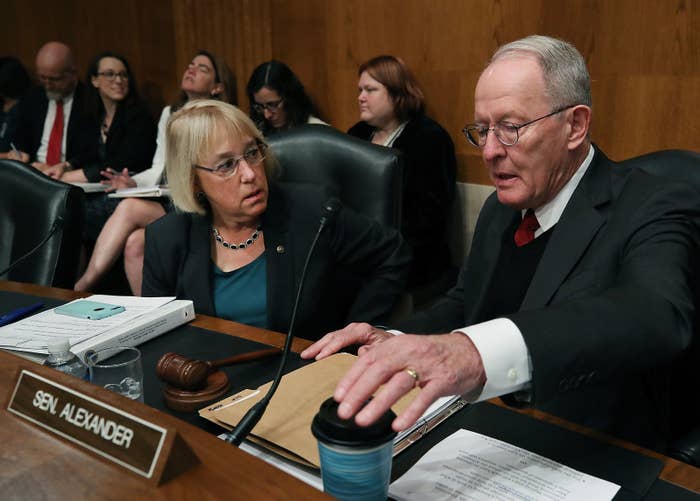
Republicans released a plan Monday that would stabilize Obamacare and could significantly lower health care costs — but it comes with sweeping new limits on abortion coverage that threaten to tank an otherwise bipartisan deal.
The abortion crackdown is unacceptable to Democrats, meaning millions of people will continue to pay higher premiums as Congress fails to pass a stabilization deal, absent some new compromise.
Democrats and Republicans have been talking for months about a bill to curtail rising insurance premiums, and have the rare opportunity to include it in a must-pass spending bill this week. Democrats say those talks were ongoing Monday when they were blindsided by Republicans releasing their own proposal.
The Republican plan would reinstate two key Obamacare subsidies, including one cut off by the Trump White House just last year, as well as give states more power to craft their own rules. One program involves the federal government helping to pay the health care costs of lower-income people on the individual markets. The second program would essentially insure the insurance companies, and protect them from major losses if their customers’ health costs came in unexpectedly high. The idea is that the federal government shouldering some of the risk allows insurers to set premiums at lower rates.
The Congressional Budget Office projects the bill would cost $19 billion to $29 billion over the next decade, and would lower premiums by 10% to $20%.
But the plan would also expand how the Hyde Amendment — legal language banning the use of federal money to pay for abortions — would apply to insurance subsidies. Currently, plans can work around the Hyde Amendment by separating out premiums that pay for abortion coverage from premiums that pay for everything else. That way insurers can receive federal help for one set of premiums, while keeping abortion coverage costs aside.
This workaround would not be available under the new GOP proposal. Plans receiving federal subsidies would not be able to offer abortion coverage at all — even if they were paid for separately. Given the amount of money at stake, this could essentially mean the end of plans that cover abortion on the individual market.
Twenty-five states already have rules banning insurance plans on the Obamacare markets from covering abortion. But three others (New York, California, and Oregon) require regulated insurance plans to include abortion coverage. Plans in these three states would be caught between contradictory rules. State law would force them to offer abortion coverage, while federal law would ban them from accepting subsidies for doing so.
Democrats say they believe the provision was pushed by House Speaker Paul Ryan, and are calling it a nonstarter. The dispute threatens to kill the deal, which would otherwise lower health care costs.
“The federal funding in this proposal would meaningfully lower premiums for middle-class people who buy their own insurance. It could even mean that premiums in much of the country would actually go down in 2019,” said Larry Levitt of the Kaiser Family Foundation.
Republicans say that it is standard to apply Hyde Amendment language to federal programs that could be used to fund abortions.
Unless a deal is reached, Congress will miss likely its last chance for some time to pass legislation to stabilize the Obamacare markets. Senate Majority Leader Mitch McConnell promised Republican Sen. Susan Collins that he would include a stabilization bill as part of a must-pass bill this year, in exchange for her supporting the GOP tax bill. So far that has not happened.
If a deal were to be reached in the next few days, it could be added to the omnibus spending bill that must pass by March 23 to avoid another government shutdown. However, some House Republicans, led by the right-wing Freedom Caucus, oppose spending any further money to support the Affordable Care Act.
UPDATE
This story was updated with information from a new Congressional Budget Office report.

